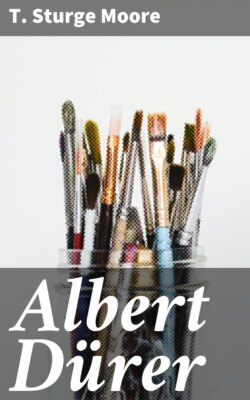Читать книгу Albert Dürer - T. Sturge Moore - Страница 34
На сайте Литреса книга снята с продажи.
III
ОглавлениеTable of Contents
We shall, I think, often do well, when considering the superb ostentation of Dürer's workmanship, with its superabundance of curve and flourish, its delight in its own ease and grace, to think of those young men among his ancestors who made their living from horses on the wind-swept plains of Hungary. The perfect control which it is the delight of lads brought up and developing under such conditions to obtain over the galloping steed, is similar to the control which it gratified Dürer to perfect over the dashing stroke of pen or brush, which, however swift and impulsive, is yet brought round and performs to a nicety a predetermined evolution. And the way he puts a little portrait of himself, finely dressed, into his most important pictures, may also carry our thoughts away to the banks of the Danube where it winds and straggles over the steppes, to picture some young horse-breeder, whose costume and harness are his only wealth; who rides out in the morning as the cock-bustard that, having preened himself, paces before the hen birds on the plains that he can scour when his wings, which are slow in the air, join with his strong legs to make nothing of grassy leagues on leagues. And first, this life with its free sweeping horizon, and the swallow-like curves of its gallops for the sake of galloping, or those which the long lashes of its whips trace in deploying, and which remind us of the lithe tendrils in which terminate Dürer's ornamental flourishes; this life in which the eye is trained to watch the lasso, as with well-calculated address it swirls out and drops over the frighted head of an unbroken colt;--this life is first pent up in a little goldsmith's shop, in a country even to-day famous for the beauty and originality of its peasant jewelry: and here it is trained to follow and answer the desire of the bright dark eyes of girls in love;--in love, where love and the beauty that inspires it are the gifts of nature most guarded and most honoured, from which are expected the utmost that is conceived of delicacy in delight by a virile and healthy race. "A pure and skilful man." Patient already has this life become, for a jeweller can scarcely be made of impatient stuff; patient even before the admixture of German blood when Albert the elder married his Barbara Holper. The two eldest sons were made jewellers; but the third, John, is set to study and becomes a parson, as if already learning and piety stood next in the estimation of this life after thrift, skill and the creation of ornament. And Germany boasts of this life beyond that of any of her sons; but her blood was probably of small importance to the efficiency that it attained to in the great Albert Dürer. The German name of Dürer or Thürer, a door, is quite as likely to be the translation, correct or otherwise, of some Hungarian name, as it is an indication that the family had originally emigrated from Germany. In any case, a large admixture by intermarriage of Slavonic blood would correspond to the unique distinction among Germans, attained in the dignity, sweetness and fineness which signalised Dürer. Of course, in such matters no sane man looks for proof; but neither will he reject a probable suggestion which may help us to understand the nature of an exceptional man.
